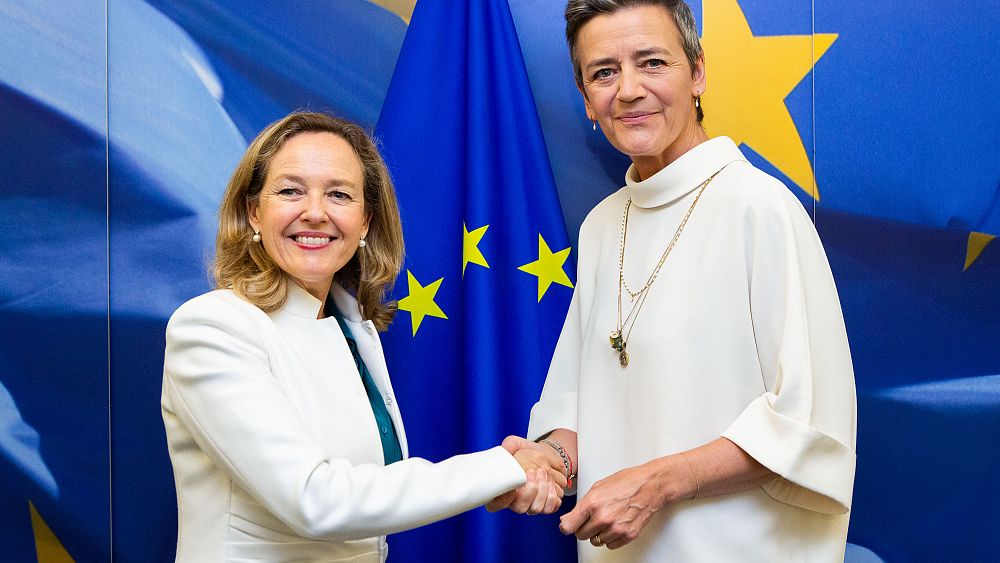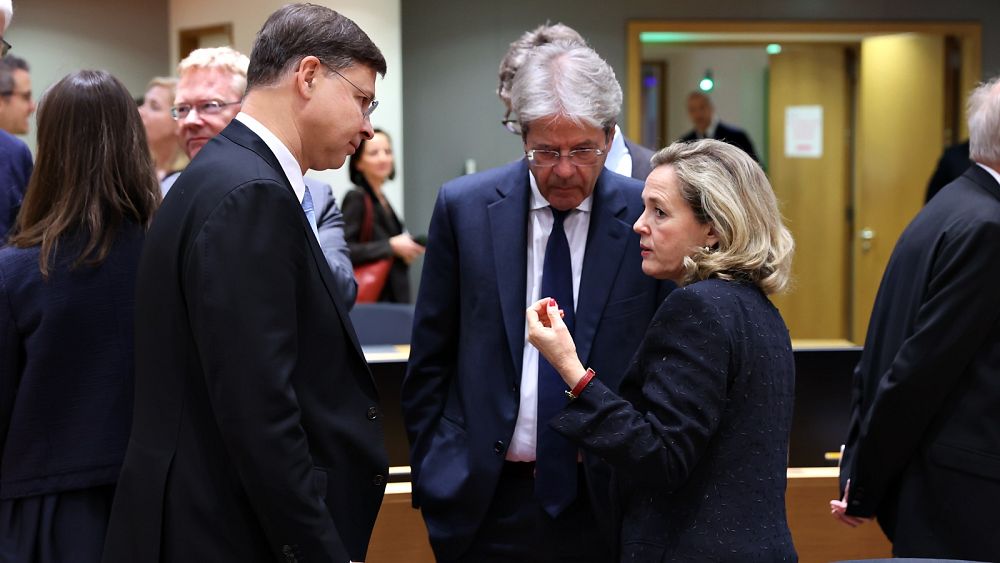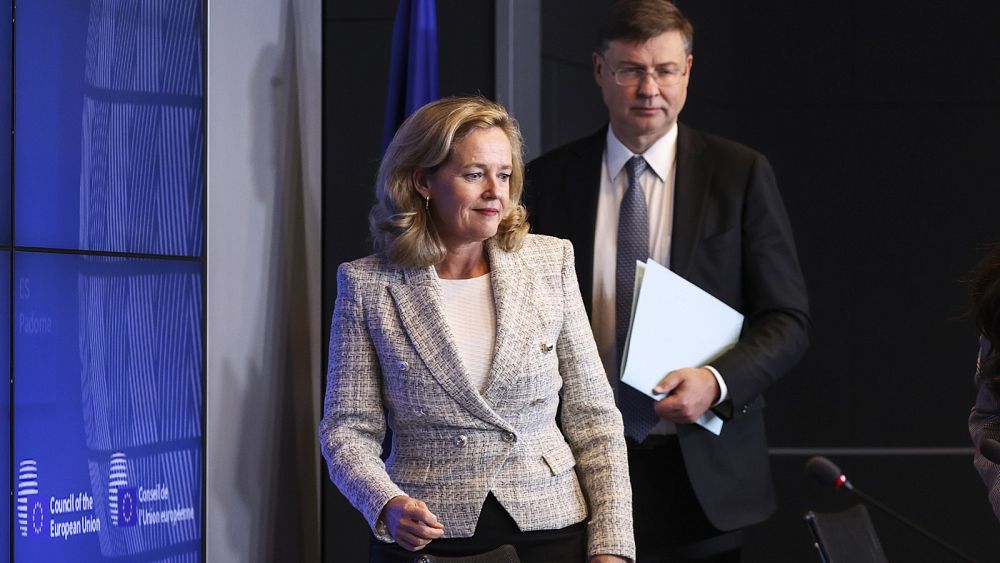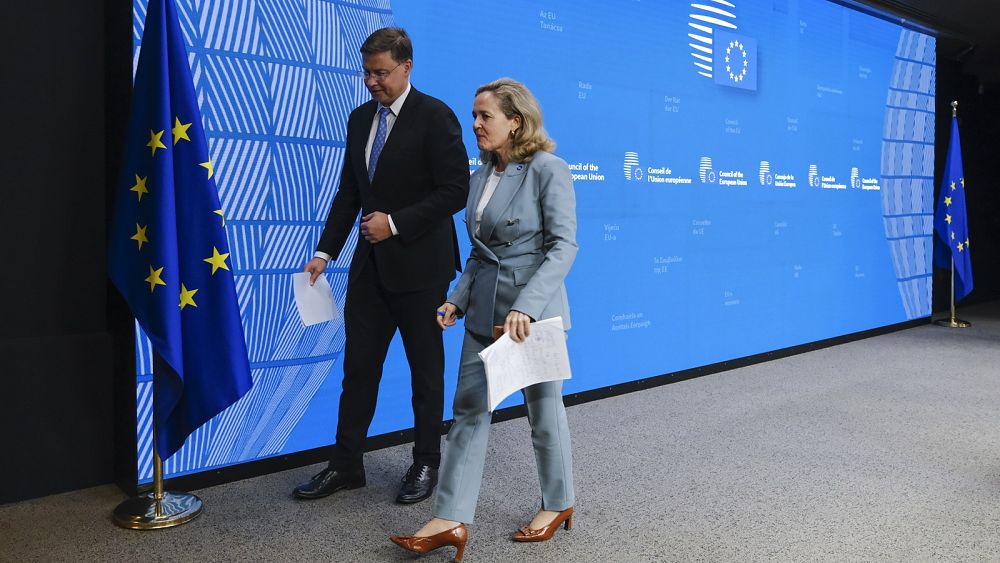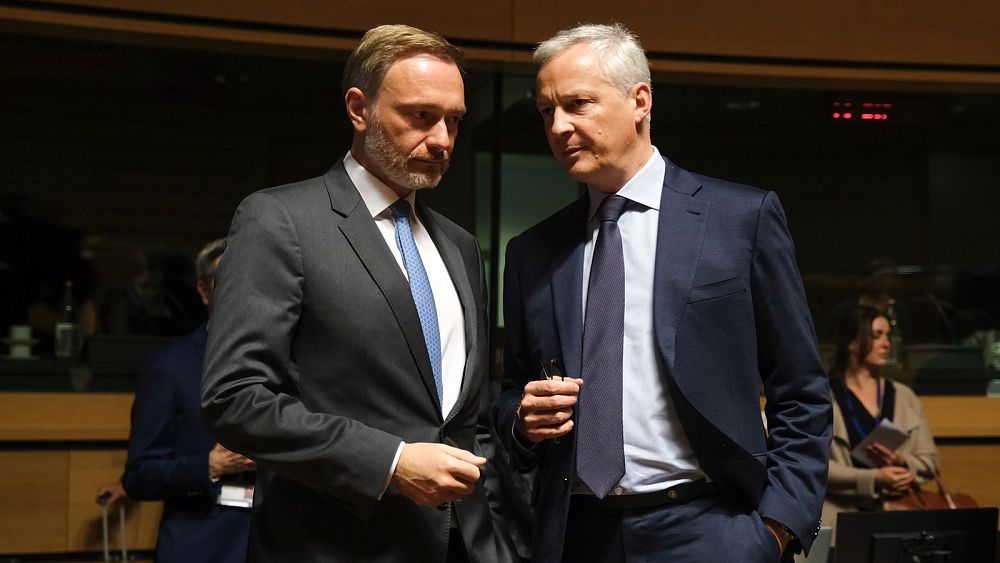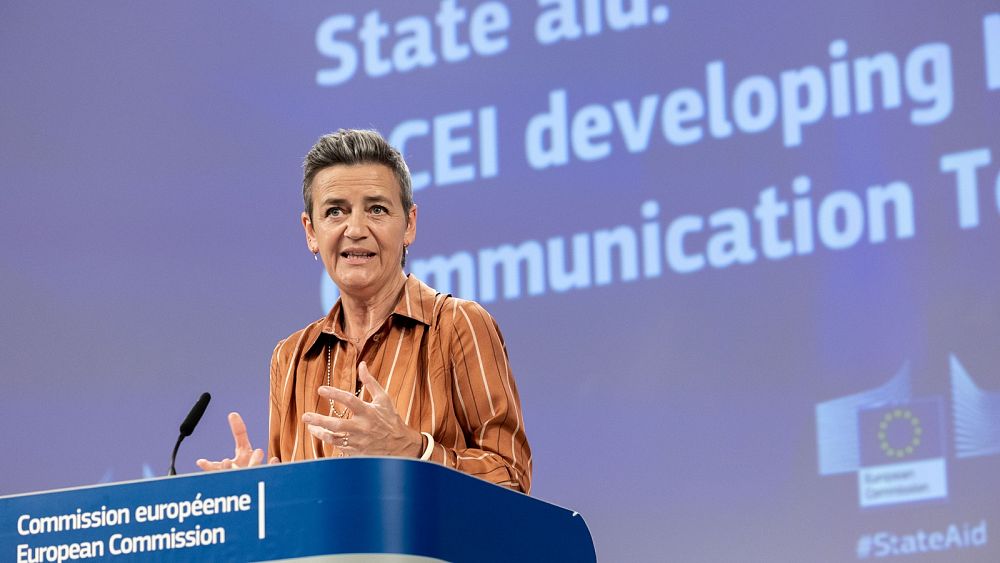World
Who’s who in the race to head the European Investment Bank?
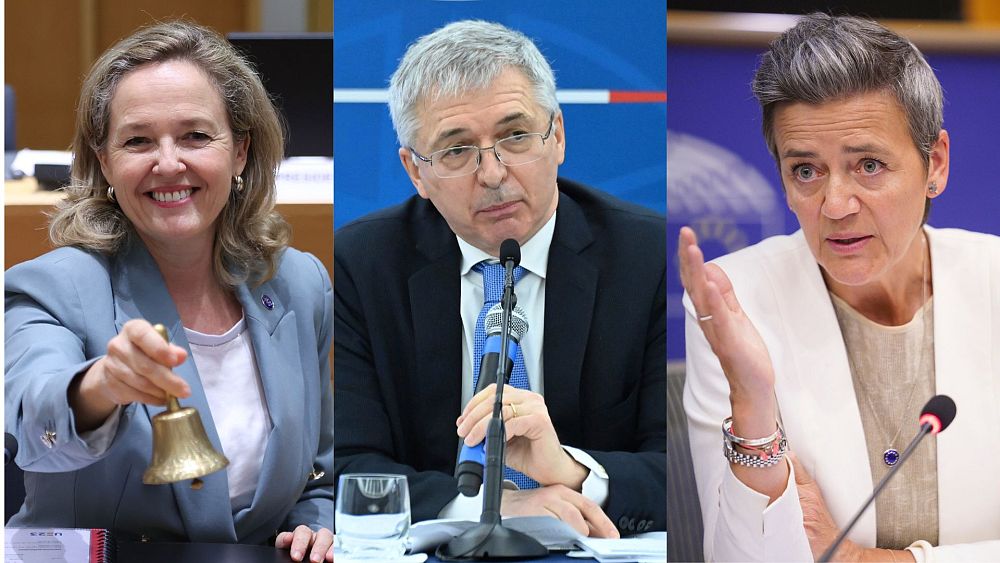
Five candidates have thrown their hats into the ring to be the next President of the European Investment Bank (EIB).
The successful applicant will lead the world’s biggest multilateral financier as it prepares to fund the reconstruction of Ukraine and crucial investments in climate action.
Spain’s finance minister Nadia Calviño and the EU’s antitrust chief Margrethe Vestager are tipped as favourites.
All eyes are now on EU finance ministers, who will discuss candidates’ bids when they gather on Friday in Santiago de Compostela, Spain, before casting their vote during an EIB board meeting expected in the coming weeks.
France and Germany, whose votes have the most weight, are yet to back a candidate.
A pending appointment to the other of the bloc’s major financial institutions, the Frankfurt-based European Central Bank (ECB), could prove critical in tipping the odds for or against Calviño.
Spain’s Margarita Delgado and Germany’s Claudia Buch are shortlisted to chair the ECB’s supervisory arm – but a Delgado appointment could block the path to the EIB for Calviño, as EU countries horse-trade over top jobs.
Euronews brings you the rundown of the candidates.
Margrethe Vestager
Not your usual Brussels bureaucrat, Vestager has gained a global reputation as the thorn in Big Tech’s side. During her nine years as the EU’s antitrust chief, she has slapped hefty fines on the world’s biggest companies for abusing their market dominance.
The Danish liberal is taking unpaid leave from the European Commission to make her EIB Presidency bid, with Commissioners Didier Reynders and Věra Jourová stepping in to cover her competition and digital portfolios.
Vestager has said she would take “more risks” in the role, arguing decisions need to be accelerated so the bank can fund Ukraine’s reconstruction while the war wages on.
“I am looking for a mandate from the governance of the bank for it to be faster and in doing so can be even more relevant,” she told the Financial Times.
Despite their common political family backing her candidacy, Vestager is unlikely to secure the support of the French president. She was recently forced to withdraw the appointment of an American as chief economist of her competition department following backlash from Emmanuel Macron, a long-time critic of US Big Tech’s unchecked influence on the EU.
In 2019, Vestager’s decision to block a rail merger between France’s Alstom and Germany’s Siemens also ruffled feathers in the Elysée.
In a further indication Paris will not back Vestager, France’s EU Commissioner Thierry Breton indicated on Wednesday that the EIB should finance nuclear energy in Europe, something Vestager is unlikely to support.
Nadia Calviño
Widely considered in the pole position is Spanish Finance Minister Nadia Calviño.
She has said that the EIB has an increasingly important role given the current high interest rates and the urgent need for more green investments.
Formerly director-general of the European Commission’s budget and competition departments, Calviño made the move from Brussels to Madrid in 2018 to be Pedro Sánchez’s economic affairs minister and has since moved up the government ranks.
She’s seen as a safe pair of hands, having guided Spain’s economy through the COVID-19 crisis and the economic turmoil following Russia’s invasion of Ukraine. She has also chaired the International Monetary Fund (IMF)’s financial committee since 2021.
But Calviño has a record of narrowly missing out on top jobs. She unexpectedly lost her bid for the Eurogroup Presidency to Ireland’s Pascal Donohoe in 2020 and withdrew from the race to head the IMF in 2019.
Calviño has the advantage of hosting the bloc’s finance ministers – who have the final decision on the appointment – next week on her home turf in Galicia.
Daniele Franco
Italy’s candidate is Daniele Franco, Mario Draghi’s former finance minister.
He also worked at the European Commission early in his career as an economic advisor, before returning to work in banking in Italy. After serving in Draghi’s cabinet, he became head of Italy’s central bank.
Franco recently denied reports that Giorgia Meloni had re-considered his nomination, assuring that he is the government’s official candidate.
“The EIB plays an important role for European countries and it will be even more important in the future, regardless of who fills the role,” he said.
Italy hopes Franco can emerge as an underdog if there is a lack of majority support for Calviño or Vestager.
Teresa Czerwińska
The third woman in the race is Poland’s Teresa Czerwińska, who currently serves as one of the EIB’s vice presidents. She oversees the EIB’s operations in Ukraine and has called on the EU to rapidly proceed with funding the country’s reconstruction as the war continues.
“Even as the war grinds on, reconstruction funds must flow. Because recovery can’t wait. Because the people can’t wait,” Czerwińska said in May.
Czerwińska was Poland’s finance minister until she was dismissed in a 2019 cabinet reshuffle after expressing scepticism over her Law and Justice government’s social spending programmes.
Her appointment would mark a turning point in the bloc’s long tradition of appointing Western European leaders to top financial roles.
Thomas Östros
Sweden has fielded current EIB vice-president Thomas Östros.
Born in a small town over 1,000 km north of Stockholm to an explosives worker and a housewife, he was an active social democrat in his youth and became a member of the Riksdag in 1994.
He brings experience in government, having served as the Swedish minister of fiscal affairs, education and industry in various governments between 1996 and 2004, before moving on to hold posts in the Swedish Bankers’ Association and the IMF.
Östros is a vocal advocate for green investments and a strong supporter of the EIB’s landmark decision to stop funding fossil fuel projects at the end of 2021.

World
Yamandu Orsi wins Uruguay’s run-off presidential election

Yamandu Orsi, the candidate for the left-wing Broad Front coalition, is projected to emerge victorious in Uruguay’s run-off election for the presidency.
He bested Alvaro Delgado of the ruling National Party to win the tightly fought race, though public opinion polls showed the two candidates in a dead heat in the lead-up to Sunday’s vote.
Orsi’s supporters took to the streets in the capital of Montevideo, as the official results started to show the former mayor and history teacher surging ahead.
Many waved the party banner: a red, blue and white striped flag with the initials FA for “Frente Amplio”, which translates to “Broad Front”.
“Joy will return for the majority,” the coalition posted on social media as Orsi approached victory. “Cheers, people of Uruguay.”
Orsi’s win restores the Broad Front to power in the small South American country, sandwiched on the Atlantic coast between Brazil and Argentina.
For 15 years, from 2005 to 2020, the Broad Front had held Uruguay’s executive office, with the presidencies of Jose Mujica and Tabare Vazquez, the latter of whom won two non-consecutive, five-year terms.
But that winning streak came to an end in the 2019 election, with the victory of current President Luis Lacalle Pou, who led a coalition of right-leaning parties.
Under Uruguay law, however, a president cannot run for consecutive terms. Lacalle Pou was therefore not a candidate in the 2024 race.
Running in his stead was Delgado, a former veterinarian and Congress member who served as a political appointee in Lacalle Pou’s government from 2020 to 2023.
Even before the official results were announced on Sunday, Delgado had conceded, acknowledging Orsi’s victory was imminent.
“Today, the Uruguayans have defined who will hold the presidency of the republic. And I want to send here, with all these actors of the coalition, a big hug and a greeting to Yamandu Orsi,” Delgado said in a speech as he clutched a large Uruguayan flag in his hand.
He called on his supporters to “respect the sovereign decisions” of the electorate, while striking a note of defiance.
“It’s one thing to lose an election, and another to be defeated. We are not defeated,” he said, pledging that his right-wing coalition was “here to stay”.
The outgoing president, Lacalle Pou, also reached out to Orsi to acknowledge the Broad Front’s victory.
“I called [Yamandu Orsi] to congratulate him as president-elect of our country and to put myself at his service and begin the transition as soon as I deem it pertinent,” Lacalle Pou wrote on social media.

Orsi had been considered the frontrunner in the lead-up to the first round of the elections.
Originally from Canelones, a coastal regional in the south of Uruguay, Orsi began his career locally as a history teacher, activist and secretary-general of the department’s government. In 2015, he successfully ran to be mayor of Canelones and won re-election in 2020.
In the 2024 presidential race, Orsi – like virtually all the candidates on the campaign trail – pledged to bolster Uruguay’s economy. He called for salary increases, particularly for low-wage workers, to grow their “purchasing power”.
He also called for greater early childhood education and employment programmes for young adults. According to a United Nations report earlier this year, nearly 25 percent of Uruguay’s children live in poverty.
But the economy was not the only issue at the forefront of voters’ minds. In a June survey from the communications firm Nomade, the largest share of respondents – 29 percent – identified “insecurity” as Uruguay’s “principal problem”.
That dwarfed the second-highest ranked topic: “Unemployment” was only picked by 15 percent of respondents.
As part of his platform, Orsi pledged to increase the police force and strengthen Uruguay’s borders, including through the installation of more security cameras.
As he campaigned, Orsi enjoyed the support of former President Mujica, a former rebel fighter who survived torture under Uruguay’s military dictatorship in the 1970s and ’80s.
Mujica remains a popular figure on Uruguay’s left, best known for his humble living arrangements that once earned him the moniker of the “world’s poorest president”.

In the first round of voting, on October 27, Orsi came out on top, with 44 percent of the vote to Delgado’s 27 percent. But his total was far short of the 50 percent he needed to win the election outright, thereby triggering a run-off.
The race got tighter from there forward. Only two candidates progressed to the run-off – Delgado and Orsi – and Delgado picked up support from voters who had backed former Colorado Party candidate Andres Ojeda, a fellow conservative who was knocked out in the first round.
Nevertheless, Orsi quickly pulled ahead after the polls closed for the run-off election on Sunday.
“The horizon is brightening,” Orsi said in his victory speech. “The country of freedom, equality and also fraternity triumphs once again.”
World
Cinematography Work at Camerimage Festival ‘Radically Different,’ Jury Members Say

Jurors at the EnergaCamerimage cinematography fest say the Golden Frog main competition films have been remarkably varied and inspiring in the event’s 32nd edition.
The 12 competing films “were radically different from each other,” said “Barbie” and “Killers of the Flower Moon” cinematographer Rodrigo Prieto, whose directorial debut, “Pedro Paramo,” is also screening at the fest. “I enjoyed that.”
The varied styles, approaches and storytellers, he added, defied easy categorization. “Happily, I didn’t notice trends, which I have noticed sometimes in the past in some festivals.”
Juror Anthony Dod Mantle, who won Golden Frogs in 2008 for his lensing of “Slumdog Millionaire” and in 2016 for “Snowden,” said, “I’ve been to this festival before and the overall collection of films and categories, I felt, was even wider. I feel slight absence of certain films from other ethnic backgrounds. They were different, these films, but they could be far more different.”
Greater diversity and inclusion in cinematography has justly been a hot topic this year at Camerimage, he added. “It’s good we embrace that, celebrate it here, because not many festivals do that.”
Dod Mantle described the current state of cinematography, based on what the jury’s seen this week, as “openly variable and that’s why we praise some films rather than others because they challenge convention.”
He also described the industry as “in a bit of a pickle,” adding, “We know that. We have to applaud ourselves and embrace and encourage every single essence of, molecule of, exploration and challenging cinema.”
Juror Lukasz Zal, who filmed “The Zone of Interest” and “Cold War,” said “I feel really inspired. I feel this kind of positive envy when you just see something which you admire, and love – cinema is still in good condition.”
And, he added, “I’m becoming hopeful that, OK, there’s still a lot to discover. For this, I really love Camerimage. When I was here, when I was a student, I was always coming back home after festival, with this feeling, kind of eager to work, to prepare and to just be really open and be full of ideas.”
Spending time here again as a top professional in his field, Zal said, “I feel again like a student.”
Juror Cate Blanchett said it’s clear cinematography has no crisis of creativity currently.
Instead, there’s a different issue: “The pickle is how one gets access and is able to see these films in the way that they’re intended to be seen.”
Technology advances in the field are also helping storytelling onscreen evolve, she added, rather than distracting from it. “Sometimes you can see there’s been huge technical advances made, or there’s been big innovations, and they haven’t yet been integrated into the stories that they’re being applied to. Whereas I thought there were so many films here that have really integrated the technology and in a completely adventurous and inventive way that was not pretentious. It was very interwoven and enmeshed with the performances and the stories.”
Jury duty at Camerimage is rewarding, said Dod Mantle, because the Golden Frog award can often help promising cinematographers break through to booming careers.
He described the potential effect of the award as “enormous.”
“The first time I came here, in competition,” he recalled, “it illustrated for me the jury was embracing cinema, celebrating something different and challenging.”
Cinematographers are keenly aware of the judgment of their peers, Dod Mantle added. “You feel quite vulnerable here. I’ve seen cinematographers leave the festival and go spend the weekend in Krakow and come back. The frog, ultimately is a beautiful thing celebrating our colleagues’ work.”
Juror Anna Higgs, a producer and columnist who works closely with BAFTA, said, “I think we should normalize cinematographers getting asked for their autographs – the fact that this frog is the idolized thing here.”
Blanchett added, “It’s very rare that you go to a festival where every single person in the auditorium sits right through the credit roll to the very end.” She noted “the respect that is shown to every single crewmember.”
Prieto recalled the impact of his own Golden Frog cinematography win in 2000 for “Amores Perros” fondly. “I do cherish that frog. It’s wonderful to get a frog, but more than anything, it’s a place where cinematography is the focus and is celebrated, and to share that obsession with so many people, and the energy of that, is really wonderful.”
Zal had a similar career boost, he said, after winning for lensing “Ida” by Pawel Pawlikowski in 2013. “That’s really the moment when somehow my career changed. I was always dreaming while having student films here. And it was beautiful to get an award from colleagues and being here and being among amazing cinematographers.
“I was put in competition with the people who I admire. Even now, sitting with Rodrigo, who for me was a huge inspiration. I was shooting my films in school inspired by ‘Amores Perros.’ Now we’re sitting together on the jury. That’s amazing, that’s beautiful.”
Blanchett described the close proximity of students and top international lensers as a unique strength of Camerimage, praising “the mentorship that goes on, how you’ll champion the works of other people.”
“I think that’s why it’s so vitally important that there’s an increased level of female participation. Because of the networking and mentorship opportunities and championing the work. The conversations and the opportunities that arise from those conversations are really important.”
Oscar-winning costume designer Sandy Powell (“Shakespeare in Love,” “The Aviator” and “The Young Victoria”) and cinematographer and documentary filmmaker Jolanta Dylewska also served on the Camerimage jury, calling earlier this week for greater diversity and inclusion in the industry.
World
Ukraine to analyze fragments of missile fired by Russia capable of carrying nuclear warheads

Investigators in Ukraine are analyzing the debris of a new intermediate-range ballistic missile (IRBM) fired by Russia at the city of Dnipro on Thursday, marking the first time the weapon had been used on the battlefield.
On Sunday, Ukraine’s Security Service showed the remaining fragments of the IRBM called Oreshnik – Russian for Hazel Tree – that struck a factory to The Associated Press.
Russian President Vladimir Putin confirmed the attack on Thursday evening in an address to the nation and said it was in direct response to the U.S. and the U.K. jointly approving Ukraine’s use of Western-supplied long-range missiles to target Russia.
The Pentagon has said the missile is based on Russia’s RS-26 Rubezh intercontinental ballistic missile (ICBM), though the wreckage has not yet been analyzed, according to security officials on site in an undisclosed location in Ukraine.
‘NEW’ RUSSIAN MISSILE USED AGAINST UKRAINE NOT HYPERSONIC, DEFENSE OFFICIALS SAY
Fragments of a rocket which struck Dnipro on November 21 are seen at a center for forensic analysis in undisclosed location, Ukraine, Sunday Nov. 24, 2024. (AP Photo/Evgeniy Maloletka)
The AP and other media were permitted to view the fragments before being taken over by investigators.
The wire service showed images of what it described as mangled and charred wires, along with an ashy airframe about the size of a large snow tire. The remains were all that were left of the IRBM, which can carry nuclear or conventional warheads.
“It should be noted that this is the first time that the remains of such a missile have been discovered on the territory of Ukraine,” a specialist with Ukraine’s Security Service said. The specialist only identified himself by his first name Oleh because he was not authorized to discuss the issue with the media.
1,000 DAYS OF WAR IN UKRAINE AS ZELENSKYY DOUBLES DOWN ON AERIAL OPTIONS WITH ATACMS, DRONES AND MISSILES

Fragments of a rocket which struck Dnipro on November 21 are seen at a center for forensic analysis in undisclosed location, Ukraine, Sunday Nov. 24, 2024. (AP Photo/Evgeniy Maloletka)
Ukraine’s Main Intelligence Directorate said the missile was launched from the 4th Missile Test Range, Kapustin Yar, in Russia’s Astrakhan region. Once launched, Ukrainian officials said, it flew for 15 minutes before striking Dnipro. The missile was carrying six warheads, each carrying six subunitions, and its speed was Mach 11.
Last week, Deputy Pentagon press secretary Sabrina Singh confirmed to reporters during a press briefing that Russia had launched the IRBM, noting that it was a “new type of lethal capability that was employed on the battlefield.”
She also said the U.S. was notified briefly before the launch through nuclear or risk reduction channels.
US EMBASSY IN KYIV CLOSED AS ‘POTENTIAL SIGNIFICANT AIR ATTACK’ LOOMS

Fragments of a rocket which struck Dnipro on November 21 are seen at a center for forensic analysis in undisclosed location, Ukraine, Sunday Nov. 24, 2024. (AP Photo/Evgeniy Maloletka)
Putin also said last week that the missile attacked targets at a speed of Mach 10.
Despite Ukraine’s and Putin’s claim that the rocket reached speeds greater than Mach 10, two U.S. defense officials told Fox News on Thursday the missile was not hypersonic, which, according to NASA, is a speed greater than 3,000 mph and faster than Mach 5.
Along with launching the IRBM for the first time on the battlefield, Putin signed a law to grant debt forgiveness to those who enlist in Russia’s army to fight in Ukraine.
US BRIEFED UKRAINE AHEAD OF PUTIN’S ‘EXPERIMENTAL INTERMEDIATE-RANGE BALLISTIC’ ATTACK

Fragments of a rocket which struck Dnipro on November 21 are seen at a center for forensic analysis in undisclosed location, Ukraine, Sunday Nov. 24, 2024. (AP Photo/Evgeniy Maloletka)
The AP reported that the measure highlights the country’s need for military personnel as it continues its war against Ukraine.
Russian state news agency Interfax said the new legislation allows new recruits enlisting for a one-year contract, to write off debts up to 10 million rubles, or about $96,000.
CLICK TO GET THE FOX NEWS APP
The law reportedly applies to debts in which a court order for collection was issued, and enforcement proceedings had commenced before Dec. 1, 2024. The legislation also applies to spouses of new recruits.
The Associated Press contributed to this report.
-

 Business1 week ago
Business1 week agoColumn: Molly White's message for journalists going freelance — be ready for the pitfalls
-

 Science5 days ago
Science5 days agoTrump nominates Dr. Oz to head Medicare and Medicaid and help take on 'illness industrial complex'
-

 Politics1 week ago
Politics1 week agoTrump taps FCC member Brendan Carr to lead agency: 'Warrior for Free Speech'
-
/cdn.vox-cdn.com/uploads/chorus_asset/file/25739950/247386_Elon_Musk_Open_AI_CVirginia.jpg)
/cdn.vox-cdn.com/uploads/chorus_asset/file/25739950/247386_Elon_Musk_Open_AI_CVirginia.jpg) Technology6 days ago
Technology6 days agoInside Elon Musk’s messy breakup with OpenAI
-

 Lifestyle1 week ago
Lifestyle1 week agoSome in the U.S. farm industry are alarmed by Trump's embrace of RFK Jr. and tariffs
-

 World1 week ago
World1 week agoProtesters in Slovakia rally against Robert Fico’s populist government
-

 News7 days ago
News7 days agoThey disagree about a lot, but these singers figure out how to stay in harmony
-

 News1 week ago
News1 week agoGaetz-gate: Navigating the President-elect's most baffling Cabinet pick
